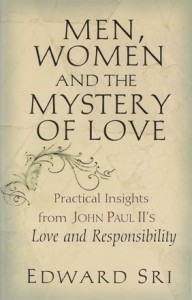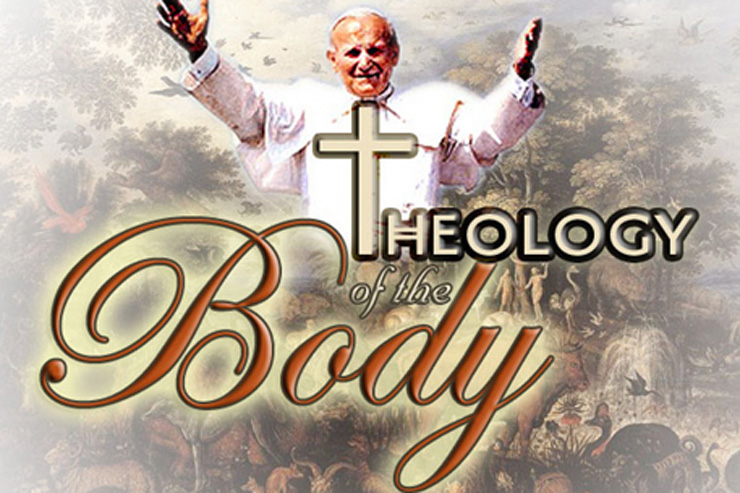Editor’s Note: This is the fifth in a series of articles written by Dr. Edward Sri on Saint John Paul II’s Love and Responsibility. The series is reprinted here with permission and originally appeared in the September/October 2005 issue of Lay Witness magazine. © 2005 Catholics United for the Faith / www.cuf.org/Laywitness/index.asp
Love & Responsibility: The Law of Gift
How does a person know if he is in a relationship of authentic, committed love or just in another disappointing romance that will not stand the test of time? That’s what John Paul II—then Karol Wojtyla—addresses in the next section of his book, Love and Responsibility, when he discusses the two sides of love.
According to Wojtyla, there are two aspects of love, and understanding the difference is crucial for any marriage, engagement, or dating relationship. On one hand, we have what’s happening inside us when we’re attracted to a person of the opposite sex.
When boy meets girl, he experiences a number of powerful feelings and desires in his heart. He may find himself physically drawn to the beauty of her body or constantly thinking about her in an emotional attraction. This inner dynamic of sensual desire (sensuality) and emotional love (sentimentality) largely shapes how the man and woman interact with each other, and it is what makes romance, especially in its early stages, so thrilling for the couple involved. Wojtyla calls this first side of love the “subjective” aspect.
Yet, while this is one aspect of love, it is not to be equated with love in the fullest sense. We know from experience that we can have powerful emotions and desires for another person without in any way being committed to them or without them being truly committed to us in a relationship of love.
This is why Wojtyla puts the subjective aspect of love in its proper place. He wakes us up and reminds us that no matter how intensely we experience these sensations, it is not necessarily love, but simply “a psychological situation.” In other words, on its own, the subjective aspect of love is no more than a pleasurable experience happening inside of me.
These emotions and desires are not bad, and they may develop into love and even enrich love, but we should not view them as infallible signs of authentic love. Wojtyla says, “It is impossible to judge the value of a relationship between persons merely from the intensity of their emotions. . . . Love develops on the basis of the totally committed and fully responsible attitude of a person to a person”; whereas, romantic feelings “are born spontaneously from sensual and emotional reactions. A very rich and rapid growth of such sensations may conceal a love which has failed to develop” (p. 145).
Turning Love Inward
Men and women today are quite susceptible to falling for this illusion of love, for the modern world has turned love inward, focusing primarily on the subjective aspect. In the last article, I wrote about the phenomenon of “Hollywood Love,” which tells us that the stronger our feelings are the stronger our love is. Wojtyla, however, emphasizes that there is another side of love that is absolutely essential no matter how powerful our emotions and desires may be. This is what he calls love’s “objective” aspect.
This aspect has a number of objective characteristics that go beyond the pleasurable feelings I experience on the subjective level. True love involves virtue, friendship, and the pursuit of a common good. In Christian marriage, for example, a husband and wife unite themselves to the common aims of helping each other grow in holiness, deepening their own union, and raising children. Furthermore, they should not only share this common goal, but also have the virtue to help each other get there.
This is why the objective aspect of love is much more than an inner look at my emotions and desires. It is much more than the enjoyment I receive from the relationship. When considering the objective aspect of love, we must discern what kind of relationship exists between me and my beloved in reality, not simply what this relationship means to me in my feelings. Does the other person truly love me more for who I am or more for the pleasure he receives from the relationship? Does my beloved understand what is truly best for me, and does she have the virtue to help me get there? Are we deeply united by a common aim, serving each other and striving together toward a common good that is higher than each of us? Or are we really just living side by side, sharing resources and occasional good times together while we each selfishly pursue our own projects and interests in life? These are the kinds of questions that get at the objective aspect of love.
Now we can see why Wojtyla says true love is “an interpersonal fact,” not simply a “psychological situation.” A strong relationship is based on virtue and friendship, not simply on experiencing good feelings and good times together. As Wojtyla puts it, “love as experience should be subordinated to love as virtue, — so much so that without love as virtue there can be no fullness in the experience of love” (p. 120).
Self-Giving Love
One of the chief hallmarks of the objective aspect of love is the gift of self. Wojtyla teaches that what makes betrothed love different from all other forms of love (attraction, desire, friendship) is that two people “give themselves” to each other. They are not just attracted to each other, and they do not simply desire what is good for each other. In betrothed love, each person surrenders himself entirely to the other. “When betrothed love enters into this interpersonal relationship something more than friendship results: two people give themselves each to the other” (p. 96).
Yet the very idea of self-giving love raises some important questions: How can one person really give himself to another? What does this mean? After all, Wojtyla himself teaches that each human person is utterly unique. Each person has his own mind and his own free will. In the end, no one else can think for me. No one else can choose for me. Thus, each person “is his own master” and is not able to be given over to another (p. 125). So in what sense can one person “give himself ” to his beloved?
Wojtyla responds by saying that while on the natural and physical level it is impossible for one person to give himself to another, in the order of love a person can do so by choosing to limit his freedom and uniting his will to the one he loves. In other words, because of his love, a person may actually desire to give up his own free will and bind it to the other person. As Wojtya says, love “makes the person want to do just that—surrender itself to another, to the one it loves.”
The Freedom to Love
For example, consider what happens when a single man becomes married. As a single man, “Bob” is able to decide what he wants to do, when he wants to do it, and how he wants to do it. He sets his own schedule. He decides where he lives. He can quit a job and move to another part of the country in an instant if he so desires. He can keep his apartment messy. He can spend his money however he pleases. And he can eat when he wants, go out when he wants, and go to bed when he wants. He is used to making life decisions on his own.
Marriage, however, will significantly change Bob’s life. If Bob decides all on his own to quit his job, buy a new car, go on a weekend vacation, or sell the home, this is probably not going to go over very well with his wife! Now that Bob is married, all the decisions that he used to make by himself must be made in union with his wife, and with a view to what is best for their marriage and family.
In self-giving love, a man recognizes in a profound way that his life is not his own. He has surrendered his own will to his beloved. His own plans, dreams, and preferences are not completely abandoned, but they are now put in a new perspective. They are subordinated to the good of his wife and any children that may flow from their marriage. How Bob spends his time and money and how he orders his life is no longer a matter of his own private choosing. His family becomes the primary reference point for everything he does.
This is the beauty of self-giving love. As a single man, Bob had great autonomy — he could order his life however he wanted. But because of his love, Bob freely chose to give up that autonomy, to limit his freedom, by committing himself to his wife and her good. Love is so powerful that it impels him to want to surrender his will to his beloved in this profound way.
Indeed, many marriages today would be much stronger if only we understood and remembered the kind of self-giving love that we originally signed up for. Instead of selfishly pursuing our own preferences and desires, we must remember that when we made our vows, we freely chose to surrender—we lovingly wanted to surrender—our wills to the good of our spouse and our children. As Wojtyla explains, “The fullest, the most uncompromising form of love consists precisely in self-giving, in making one’s inalienable and nontransferable ‘I’ someone else’s property” (p. 97).
The Law of the Gift
Now we come to the greatest mystery of self-giving love. At the heart of this gift of self is a fundamental conviction that in surrendering my autonomy to my beloved, I gain so much more in return. By uniting myself to another, my own life is not diminished but is profoundly enriched. This is what Wojtyla calls the “law of ekstasis” or the law of self-giving: “The lover ‘goes outside’ the self to find a fuller existence in another” (p. 126).
In an age of vigorous individualism, however, this profound point from Wojtyla may be difficult to understand. Why should I go outside myself to find happiness? Why would I ever want to commit myself to someone else in this radical way? Why would I want to give up the freedom to do whatever I want with my life? These are the questions of modern man.
However, from a Christian perspective, life is not about “doing whatever I want.” It is about my relationships—about fulfilling my relationship with God and with the people God has placed in my life. In fact, this is where we find fulfillment in life: in living our relationships well. But to live our relationships well, we must often make sacrifices, surrendering our own will to serve the good of others. This is why we discover a deeper happiness in life when we give ourselves in this way, for we are living the way God made us to live, which is the way God Himself lives: in total, self-giving, committed love. As one of Wojtyla’s favorite lines from Vatican II says, “Man finds himself only by making himself a sincere gift to others” (Gaudium et Spes, no. 24).
This statement from Vatican II is especially applicable to marriage, where self-giving love between two human persons is seen most profoundly. In committing myself to another person in betrothed love, I certainly limit my freedom to “do whatever I want.” But I at the same time open myself up to an even greater freedom: the freedom to love. As Wojtyla explains, “Love consists of a commitment which limits one’s freedom—it is a giving of the self, and to give oneself means just that: to limit one’s freedom on behalf of another. Limitation of one’s freedom might seem to be something negative and unpleasant, but love makes it a positive, joyful and creative thing. Freedom exists for the sake of love” (p. 135).
Therefore, while the modern individualist may see self-giving love in marriage as something negative and restrictive, Christians view such limitations as liberating. What I really want to do in life is to love my God, my wife and kids, and my neighbor—for in these relationships I find my happiness. And if I am to love my wife and kids and be totally committed to them, I must be free from having my selfish desires dictate my life and rule my household. In other words, I must be free from the tyranny of “doing whatever I want.” Only then am I free to live the way God made me. Only then am I free to be happy. Only then am I free to love.
Acknowledgement
(This is the fifth in a series on Blessed John Paul II’s Love and Responsibility)
 If you enjoyed this article from Edward Sri’s series on Saint John Paul II’s, Love and Responsibility, and want to learn more about theology of the body, see his book, Men, Women and the Mystery of Love: Practical Insights on John Paul II’s Love and Responsibility (Servant Books).
If you enjoyed this article from Edward Sri’s series on Saint John Paul II’s, Love and Responsibility, and want to learn more about theology of the body, see his book, Men, Women and the Mystery of Love: Practical Insights on John Paul II’s Love and Responsibility (Servant Books).
All references in this column to Saint John Paul II’s Love and Responsibility are taken from the 1993 edition, published by Ignatius Press.
Reprinted with permission from the September/October 2005 issue of Lay Witness magazine. © 2005 Catholics United for the Faith / www.cuf.org/Laywitness/index.asp















